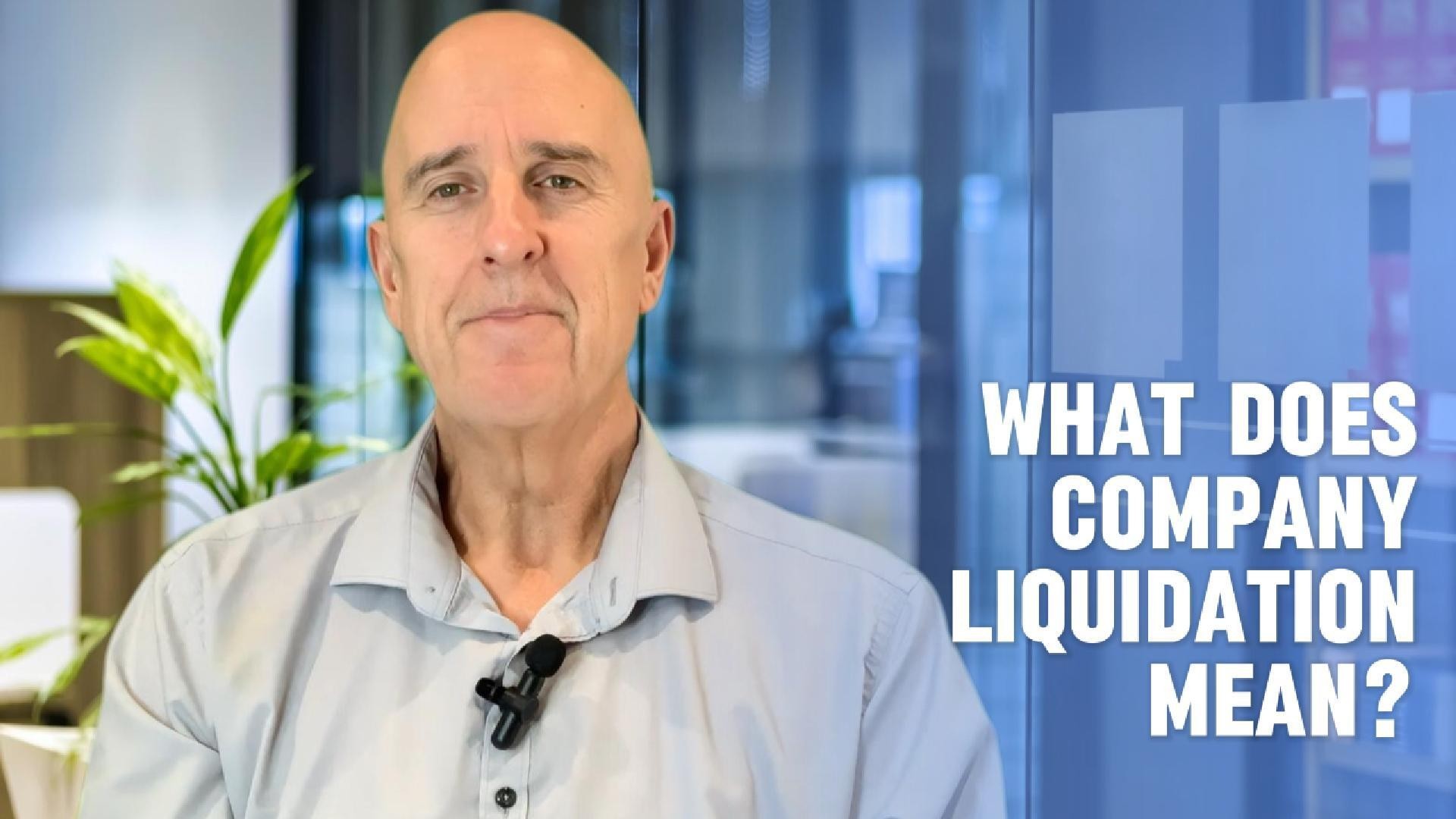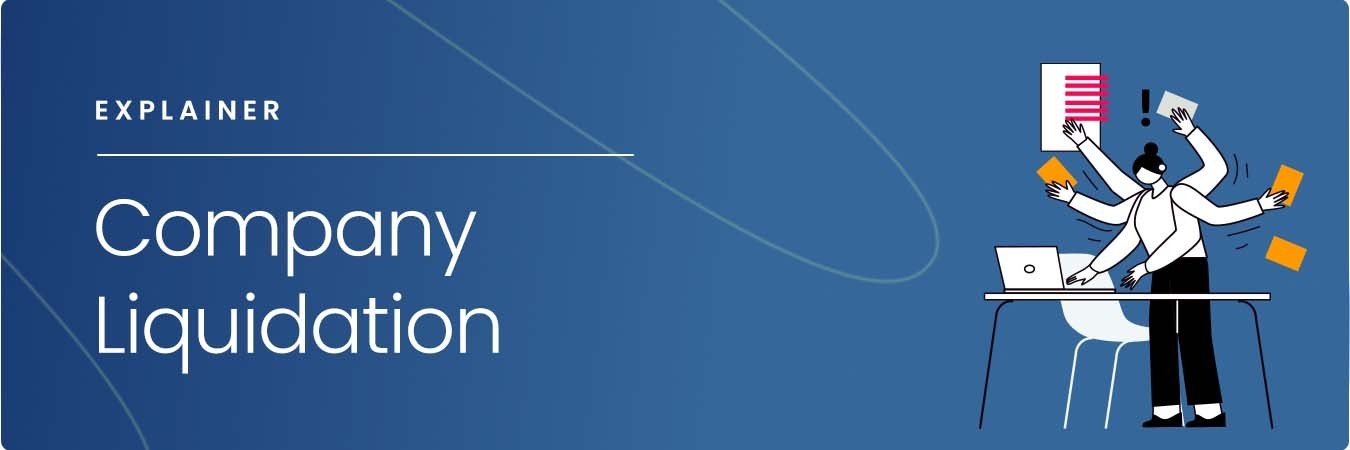
Understand your company's position and learn more about the options available
Require Immediate Support? Free Director Helpline: 0800 644 6080
Free Director Helpline: 0800 644 6080
Updated:
Liquidation is a formal insolvency procedure which is used to close a limited company which is no longer needed or wanted. There are several types of liquidation. The one most suitable for your company will depend on whether the business is solvent or insolvent at the time of liquidation, and whether the company is being liquidated voluntarily by its directors, or is being forced into liquidation by order of the court.
Liquidation is the formal process of closing a limited company with or without debts. Liquidation can be used to wind up a company due to insolvency, or simply as a means to extract the proceeds from a profitable and solvent business.
There are three main types of liquidation in business: Creditors’ Voluntary Liquidation, Members’ Voluntary Liquidation, and Compulsory Liquidation.
Free 60 Second Test
For Ltd Company Directors
What are you looking to do?
Choose below:
A limited company can only be liquidated by a licensed insolvency practitioner who will take on the role of the company's liquidator.

Get a Quote Find Your Nearest Office
A licensed insolvency practitioner will be appointed to handle the liquidation process. It will be their role to identify all company assets before selling (or liquidating) these for the benefit of creditors. Any outstanding debts which remain after this process will be written off, unless they have been secured by a director’s personal guarantee. The company will then be wound up with Companies House, its name removed from the register of limited companies; it will then cease to exist as a legal entity.
“Spoke with Chris who put me at ease straight away. He was very knowledgeable and listened intently to all my worries and concerns. Will definitely be using Real Business Rescue and advise anyone with business issues to give them a call.”
Diana

Our Confidential Test will help your understand your:
Plus much more ...
60 Second Test
There are three main types of liquidation, and while all seek to achieve the same end result – that is the formal closure of the company – each process is distinct. The procedure used to place your company into liquidation depends mainly on its financial position at the time of entry into liquidation.
A company can be liquidated regardless of whether it is solvent or insolvent.
For solvent companies, this is done by way of a Members’ Voluntary Liquidation (MVL), while insolvent companies are liquidated through either a Creditors’ Voluntary Liquidation (CVL) or Compulsory Liquidation (WUC).

A Creditors' Voluntary Liquidation (CVL) is initiated by the company’s directors when it has become clear that the company in question is insolvent and the chances of affecting a successful turnaround or restructuring are unlikely.
While this is a voluntary process, a CVL is typically only entered into when there are no other alternatives open to the company. CVL is often triggered by a downturn in company cash flow and unmanageable business debts. Directors should take early advice if they're experiencing issues such as the loss of a key customer or contract, tax arrears with HMRC, or being unable to repay your bounce back loan; all typical warning signs of a company in financial distress.
As the director of a limited company, you have a number of legal obligations you must adhere to once you are aware your company is insolvent. One of these is placing the interests of your creditors above those of the company and its shareholders. In essence this means you should not do anything to worsen the position of creditors, such as accruing additional debt or reducing company assets.
Seeking the advice of a licensed insolvency practitioner at this early stage of insolvency reflects favourably on your conduct as director.
In some cases a company will be liquidated by order of the court rather than voluntarily by its directors. This typically happens following the issuing of a Winding Up Petition (WUP) by one or more of the company’s creditors. Following a WUP being advertised, the company’s bank accounts will be frozen to prevent assets being removed. The WUP will be heard by a judge, and if there is no adequate defence, a Winding Up Order will be granted which will lead to the company being forcibly wound up.
With compulsory liquidation an Official Receiver will be appointed to handle the winding up of the company and to deal with its creditors. The Official Receiver will be allocated by the courts, and their role will be to identify any company assets, realise these for the benefit of outstanding creditors, before formally winding up the company. An investigation into the conduct of the directors will then be undertaken to ascertain the reasons behind the company’s ultimate failure.
A Members’ Voluntary Liquidation – or MVL – is a liquidation option designed as a way for solvent companies to formally close their business when a company has reached the end of its useful life. This often happens when its director(s) have no further use for the company – either due to retirement or simply because they are moving on to a new venture – and want to access the profits tied up in the business.
The main benefit of an MVL is that it allows for funds to be extracted in a tax-efficient manner. This is because funds taken from a company via an MVL are treated as capital gains rather than income, therefore they are subject to Capital Gains Tax rather than Income Tax. As an added incentive, Business Asset Disposal Relief can also be applied which, if you qualify, will reduce the rate of Capital Gains Tax payable up to a lifetime limit of £1m worth of gains.
MVLs do come with a cost attached so they are typically only suitable for those companies with in excess of £25,000 to distribute.
Unfortunately, there is no single answer to this question. The procedure will be handled differently for a compulsory liquidation that it would be dealt with in a voluntary liquidation; likewise a solvent liquidation is different to an insolvent liquidation. Your appointed insolvency practitioner will be able to explain the intricacies of each before you go ahead.
Here is a basic timeline of what transpires in the voluntary winding-up of an insolvent company via a CVL:
Worried about the rise in National Insurance?
The 2024-25 tax year increase in the rate of employer National Insurance contributions is adding yet more pressure onto already squeezed company cash flows. If the increase in National Insurance is the last straw for your company’s finances, talk to the experts at Real Business Rescue.
Our team of licensed insolvency practitioners are available now - 0800 644 6080
While placing a company into liquidation is the formal process of bringing the business to an end, this is not the only way this can be achieved. In some situations, a full liquidation procedure will not be required. Instead, the company may be able to be dissolved; this is also known as company strike off.
Company strike off – or dissolution – is an informal process which allows a company to be removed from the register held at Companies House. This is achieved by its directors submitting a DS01 form and paying the relevant fee. A notice will be placed in the Gazette advertising of the strike off application and so long as no objections are received, the company will be struck off the register. Once it is taken off the register, it ceases to exist as a legal entity. It is often a quicker, easier, and cheaper alternative to liquidation; however, you should be aware that it is not suitable for all companies and all situations.
Dissolution is aimed at those companies which have reached the end of their useful life and are no longer required by the directors/shareholders; ideally, they should hold no assets or liabilities at the point of strike off.
If strike off is attempted by an insolvent company – that is, one which has outstanding debts – it should be expected that an objection will be lodged by a creditor; if this is done, the process will be halted and the company will remain active. It is in a creditor’s interests to stop your company being struck off should debts exist, as once a company is dissolved the money owed is not easily recoverable without a lengthy and complex process to reinstate the company to the register.
On the reverse side, if your company has assets including cash at bank, these become ‘bono vacantia’ upon strike off, with ownership passing to the Crown. Therefore, if your company has debts or assets, liquidation is the most appropriate way of closing the business and tying up its outstanding affairs.
Whether you have made the decision to walk away from a profitable business and would like to extract the profits tied up in the company, or whether escalating debts and falling income means the business can no longer service its outgoings, expert advice is vital in helping you make the right decision for you and your company.
Company liquidation may well be the answer, however, you must remember that the liquidation of a company, whether solvent or insolvent, is a major step to take and you must take professional advice to ensure this is appropriate for you and your business. A licensed insolvency practitioner will be able to discuss your options, explain the pros and cons of each, discuss your potential eligibility for redundancy, and make an expert recommendation about how you should proceed.
In the event of your company being insolvent, this may mean that you have to cease trading immediately in order to protect company assets and shield creditors from further losses; in some instances, however, continuing to trade may be advised if this will ultimately increase the funds available to creditors. It is only by taking the advice of a licensed insolvency practitioner that you can be sure whether continuing to trade is the right thing to do; get this wrong and you could find yourself personally liable for any resultant losses suffered by creditors.
As a formal insolvency procedure, liquidation can only be entered into following the appointment of a licensed insolvency practitioner. They will take on the role of liquidator and will be responsible for a number of things during the process including liaising with creditors, identifying and recovering company assets, and distributing the proceeds of these according to a designated hierarchy. In a solvent liquidation proceeds will be distributed to shareholders, while in the case of an insolvent liquidation, any recoverable funds will be split amongst the company’s outstanding creditors.
If your company is struggling with unmanageable debts, squeezed cash flow, or an uncertain future, you are far from alone. We speak to company directors just like you every single day, and we are here to give you the help and advice you need.
Call our team today on 0800 644 6080
If you are considering liquidation for your limited company, taking advice from a licensed insolvency practitioner should be your next step. Real Business Rescue have a nationwide network of over 100 licensed insolvency practitioners ready to provide the help and guidance you need when it comes to your options to closing your business and your potential entitlement to director redundancy. With a network of offices located up and down the country you are never far away from expert advice.
Call Real Business Rescue today on 0800 644 6080 to speak to a member of our team and arrange a free and completely confidential consultation with a licensed insolvency practitioner in your local area.
Still unsure whether liquidation is right for your company? Don't worry, the experts at Real Business Rescue are here to help. Our licensed insolvency practitioners will take the time to understand the problems your company is facing before recommending the best course of action going forward based on your own unique circumstances.

Complete the below to get in touch
For Ltd Company Directors
What are you looking to do?
Choose below:
We provide free confidential advice with absolutely no obligation.
Our expert and non-judgemental team are ready to assist directors and stakeholders today.

Understand your company's position and learn more about the options available

Find your nearest office - we have more than 100 across the UK. Remote Video Meetings are also available.

Free, confidential, and trusted advice for company directors across the UK.